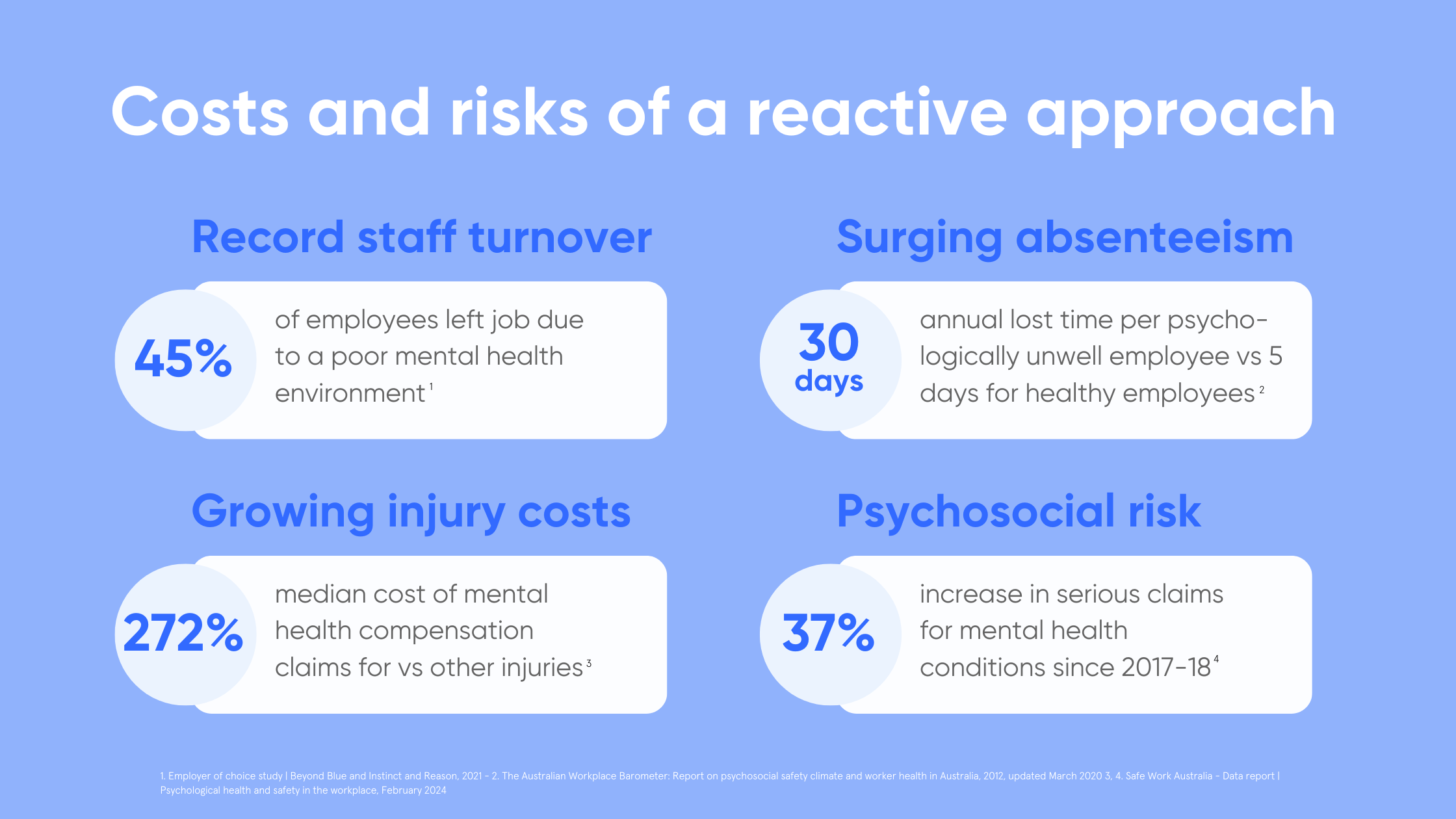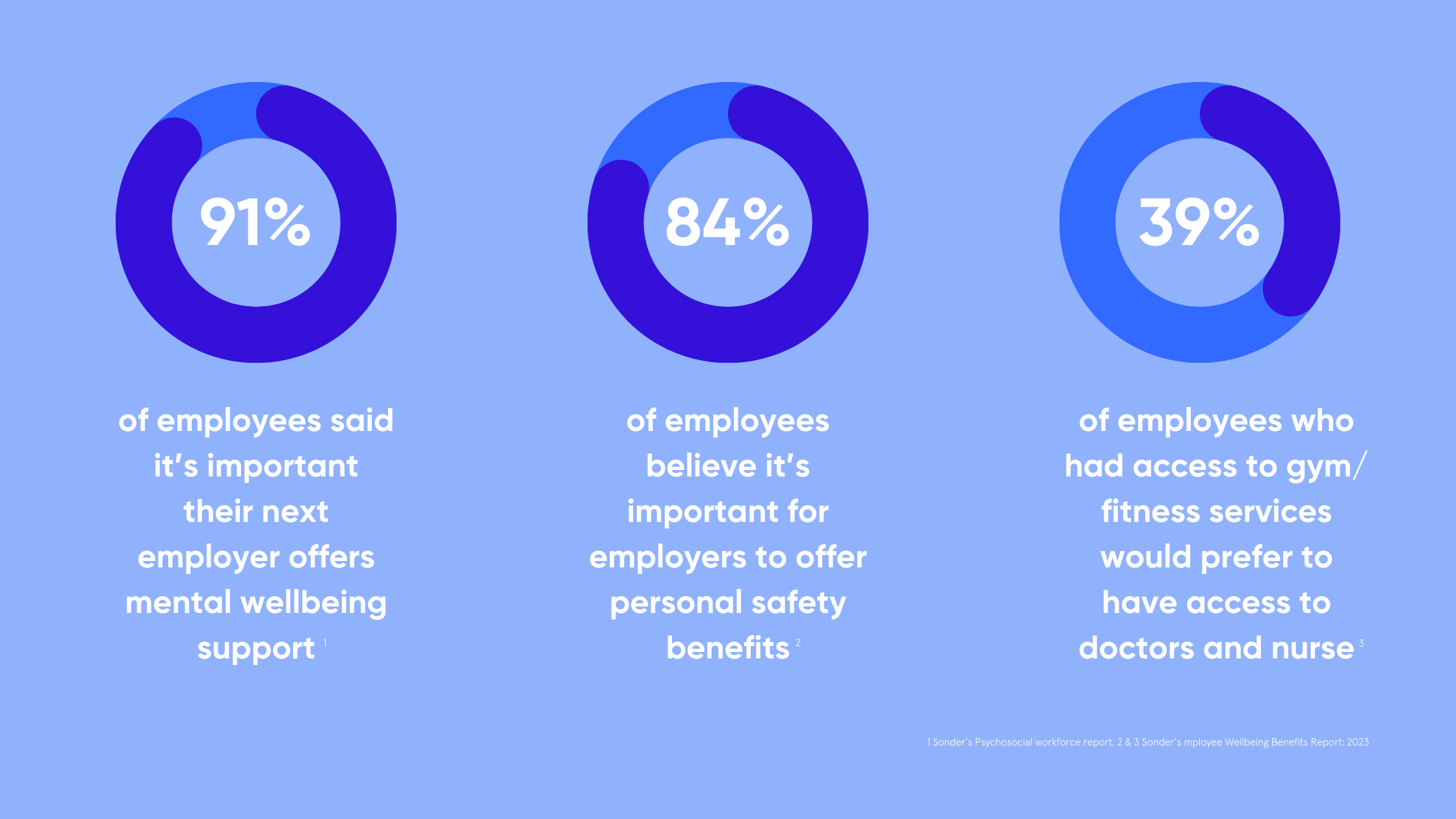The TL;DR:
- EAPs are not mandatory for most businesses but provide essential support for mental health, substance abuse, and more, enhancing workplace wellbeing.
- The key to implementing EAPs effectively is to ensure these programs are built in consultation with staff and focus on delivering holistic, preventative care.
- Plus, many businesses are turning to alternative EAP providers (like Sonder), offering a proactive approach to whole person care that ensures high utilisation rates.
As an employer, you want to do everything you can to get the best out of your people. For many companies, Employee Assistance Programs (EAPs) have been rolled out as a way to help employees navigate personal and professional challenges through mental health-focused counselling services.
However, for organisations that have yet to implement EAPs, the question arises: Are EAPs mandatory?
With so many legal and ethical obligations to consider, it’s important to understand your responsibilities as an employer and whether EAPs are the right choice for your business. In this blog, we’ll explore whether EAPs are mandatory, the benefits for organisations, and practical tips and tricks for implementing EAPs effectively.
Your legal obligations, explained: Are EAPs mandatory?
The question of whether employers are required to provide Employee Assistance Programs (EAPs) is nuanced and depends on the kind of organisation you work in.
In Australia, the Employee Assistance Professional Association of Australasia (EAPAA) is the peak governing body of EAPs. The organisation aims to help employees and their loved ones gain the support they need to address personal or work-related issues impacting their performance, health and wellbeing through the use of EAPs.
Currently, 80% of Australia’s top 500 companies have rolled out EAPs. However, Australian businesses are not legally required to offer EAPs to their teams. In fact, the only employees who have legally mandated access to EAPs are staff working in Government departments.
While not explicitly related to EAPs, Australian Work Health and Safety (WHS) laws require employers to “ensure the health and safety of your workers”. There are a range of obligations placed upon businesses, from providing a “safe work environment” to “monitoring the health and workers and condition at the workplace”.
????Sonder tip: Depending on your industry, you may need to comply with industry-specific WHS requirements, especially when it comes to safeguarding the health and well-being of your team.
Although not a legal requirement, EAPs can help businesses to meet their WHS obligations by:
- Prioritising workplace health and safety: Legislation often requires employers to address psychological risk factors, not just physical hazards. EAPs offer company-wide support and resources related to mental health and general wellbeing that staff can access free of charge.
- Meeting ethical obligations: Beyond legal requirements, employers have an ethical duty to support their staff’s wellbeing. With EAPs, or similar services, companies can demonstrate that they’re invested in safeguarding the health and wellbeing of team members with practical resources and support services.
- Adhering to industry standards and best practices: In some sectors, offering EAP services is considered a best practice, reflecting a commitment to employee health and wellbeing.
Ethical considerations: the value of EAPs
So, if EAPs aren’t mandatory, are these programs still worth implementing? In short, absolutely.
Currently, work-related injuries and employee ill-health are costing Australian businesses $28.6B. In fact, many organisations are taking a traditional approach to health, wellbeing and safety solutions that are reactive by design. Care is delivered too late at moments of crisis, uptake is incredibly low, and the solutions on offer are too inflexible to be effective.

The good news? EAPs have the ability to tackle these workplace challenges head-on by reducing absenteeism, improving productivity, and supporting employee mental health.
Alongside the direct financial benefits, EAPs offer a stack of powerful benefits to companies, including:
- Addressing work-related challenges: EAPs aim to help employees navigate personal and professional hurdles, which, in turn, could enhance workplace productivity at both an individual and team level.
- Supporting employee mental health: Providing access to mental health and substance abuse support services through an EAP could reduce absenteeism and improve wellbeing.
- Cultivating a positive work environment: Establishing a supportive culture where employees feel valued can improve morale, reduce turnover and boost staff loyalty and retention.
A key trend emerging for Australian employers is that employees’ expectations are growing regarding EAPs. While a handful of counselling sessions have long been the approach of choice, top talent are now seeking out employers who offer holistic wellbeing services that extend beyond moments of crisis.
“Increasingly, what we’re finding is that talent will move if they don’t feel like the whole of the [EAP] offering is aligned to what they want. We’ve got a reasonably young workforce. Our emerging workforce is that 35 and under age cohort. And I think increasingly in that cohort really wanting to understand is: ‘Is the organisation I’m joining got my best interests at heart? Not only are they gonna give me the creative stuff, but are they actually going to create an environment where I can thrive and do my best work?'”
Ben Cividin
People Manager, Charter Hall

How to implement EAPs effectively
Despite not being mandatory, implementing an EAP or one of their alternatives, allows companies to offer support to their employees.
But to get the most out of a wellbeing service, employers need to ensure these programs are designed to deliver 1:1 experiences that assess individual needs holistically, identify issues early and guide people on their own unique care pathway.
In practical terms, here’s how employers can implement EAPs effectively:
- Bring your people on the journey: Run surveys and focus groups to understand what support services your people care about, giving everyone a meaningful voice in the EAPs you develop.
- Prioritise preventative care: Design your program to proactively safeguard against wellbeing and health crisis events with a suite of tools, content, and resources that actively prevent harm (rather than only intervening in moments of crisis).
- Ensure employee confidentiality: Trust is key to the uptake of EAPs, so ensure your programs prioritise confidentially and are run by clinicians who adhere to strict professional codes of ethics.
- Deliver holistic support services: Look beyond EAPs that focus solely on mental health concerns and build in personal safety tools, medical assistance and preventative wellbeing support.
“It’s so important to ensure that your people are able to seek help whenever it makes sense for them. Accessibility is becoming increasingly crucial because many individuals are working varying hours across many diverse job roles. We don’t know when we need support. It’s so important to ensure that your people are able to seek help whenever it makes sense for them.”
Leanne Naber
Senior Account Executive, Sonder
While traditional EAPs offer these potential advantages, many are no longer keeping up with the growing expectations of employees. Instead, alternative EAPs (like Sonder) are stepping up by offering a more holistic approach to employee care that’s focused on proactive, preventive care pathways.
Here’s how Sonder differs from traditional EAPs:
- Holistic approach: Sonder treats the whole person by integrating medical advice, safety, and mental health support, moving beyond the symptom-focused approach of traditional EAPs.
- Accessibility and engagement: With 24/7 access via a user-friendly app, Sonder ensures that help is always available when needed, leading to significantly higher utilisation rates than traditional EAPs, which can be as low as 5%.
- Comprehensive, proactive support: Sonder offers a broad range of services, including in-person critical incident support, one-touch personal safety tools, and medical advice from accredited health professionals.
If you’re looking for an early intervention platform that prevents crises before they cost you (or your people), it’s worth exploring EAP alternatives like Sonder.
The way forward with Employee Assistance Programs and their alternatives
Want to learn more? Dive deeper into the world of EAP alternatives and discover how they can transform your organisation with our ultimate EAP buyer’s guide.
- Learn how to compare vendor offerings
- Discover what makes EAP alternatives different
- Gain insider tips and statistics
- Write a convincing business case

Want to learn more?
Ready to experience a modern approach to employee care? Get in touch with Sonder today to discover how our platform can benefit your organisation.



